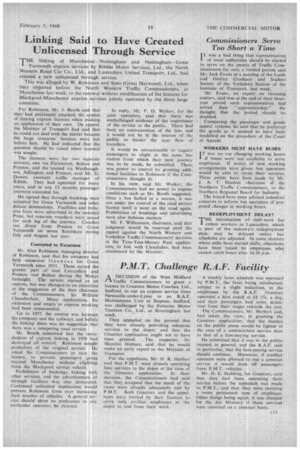Linking Said to Have Created Unlicensed Through Service
Page 57

If you've noticed an error in this article please click here to report it so we can fix it.
1HE linking of Manchester Nottingham and Nottingham Great Yarmouth express services by Ribble Motor Services, Ltd., the North Western Road Car Co., Ltd., and Lancashire United Transport, Ltd., had created a new unlicensed throUgh service.
This was alleged by W. Robinson and Sons (Great Harwood), Ltd., when they objected before the North Western Traffic Commissioners, at Manchester last week, to the renewal without modification of the licences for Blackpool-Manchester express services jointly operated by the three large concerns.
For Robinson, Mr. J. Booth said that they had preViouslY attacked the system of linking express licences when making an application of their own. On appeal, the Minister of Transport had said that he could not deal with the matter because the large concerns' licences were not before him. He had indicated that the question should be raised when renewal was sought.
The licences were for two separate services, one via Farnworth, Bolton and Preston, and the second via Westhoughton, Adlington and Preston. said Mr. G. Dawes, assistant traffic manager of Ribble. They had operated for many years, and in any 12 months passenger journeys exceeded lm.
He agreed that through bookings were accepted for Great Yarmouth and other distant destinations. Facilities and inclusive fares were advertised in the national Press, but separate vouchers were issued for each leg of the journey. Coaches ran direct from Preston to Great Yarmouth on seven Saturdays during July and August last year.
Converted to Excursion
Mr. Alan Robinson, managing director of Robinson, said that his company had held excursion lie e nc es for Great Yarmouth since 1931. These served the greater part of east Lancashire and Preston and Bolton during the Wakes fortnight. The service started as an express, but was changed to an excursion at the suggestion of the then chairman of the Commissioners, Sir William Chamberlain. Many applications . for extension and return to express working had been unsuccessful.
Up to 1957, the contest was between his company and the railways, and before the linking there was no suggestion that there was a competing road service.
Mr. Booth submitted that the introduction of express linking in 1956 had destroyed all control. Robinson sought protection of the original service. He asked the Commissioners to vary the licence, to prevent passengers going beyond Manchester without alighting from the Blackpool service vehicle.
Prohibition of bookings, linking with other services, and the advertisement of through facilities was also demanded. Continued unlimited duplication would prevent Robinson from ever increasing their number of vehicles. A general service should show no preference to any particular operator, he claimed.
in reply, Mr. F. D. Walker, for the joint operators, said that there. was unchallenged evidence of the importance of the service to the public. There had been no contravention of the law, and it would not be in the interest of the public to hinder the easy • flow of travellers.
It would be unreasonable to require passengers to alight at the same bus station from which their next journey was to be made, he submitted. There was power to control by granting additional facilities to Robinson if the Commissioners thought fit.
In his view, said Mr. Walker, the Commissioners had no power to impose conditions such as Mr. Booth suggested. Once a bus hatted in a station, it was not under the control of the road service licence until it went on the road again. Prohibition of bookings and advertising were also dubious matters.
Mr. F. Williamson, chairman, said that judgment would be reserved until the appeal against the North Western and Yorkshire Traffic Commissioners' decision in the Tyne-Tees-Mersey Pool application, to link with Llandudno, had been announced by the Minister.




























































































































